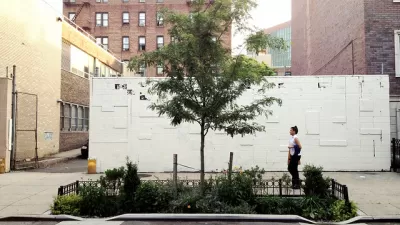Nate Berg looks at a new study analyzing the cost benefits of large-scale green infrastructure projects, which demonstrates that governments are wasting billions of dollars a year by not going green.
While large-scale green infrastructure projects such as roof gardens or permeable streets are often characterized as being hugely expensive, a new study, co-authored by the American Society of Landscape Architects, American Rivers, the Water Environment Federation, and ECONorthwest, set out to compare the costs of such projects with traditional infrastructure projects.
According to Berg, in "Looking at 479 case studies of green infrastructure projects around the U.S., the report finds that the majority of projects turned out to be just as affordable or even more so than traditional "grey" infrastructure. About a quarter of projects raised costs, 31 percent, kept costs the same and more than 44 percent actually brought costs down."
Paying particular attention to the benefits of green infrastructure projects to cities with combined sewer systems, the study found significant cost savings for early adopter communities. Furthermore, as Berg notes, "by allowing natural processes to take over the work we've been building infrastructure to handle, operations and maintenance costs also fall. The report concedes that some maintenance on green infrastructure will still be required, but that it is significantly less than what's required by traditional infrastructure."
FULL STORY: Green Infrastructure Could Save Cities Billions

Alabama: Trump Terminates Settlements for Black Communities Harmed By Raw Sewage
Trump deemed the landmark civil rights agreement “illegal DEI and environmental justice policy.”

Study: Maui’s Plan to Convert Vacation Rentals to Long-Term Housing Could Cause Nearly $1 Billion Economic Loss
The plan would reduce visitor accommodation by 25% resulting in 1,900 jobs lost.

Planetizen Federal Action Tracker
A weekly monitor of how Trump’s orders and actions are impacting planners and planning in America.

Waymo Gets Permission to Map SF’s Market Street
If allowed to operate on the traffic-restricted street, Waymo’s autonomous taxis would have a leg up over ride-hailing competitors — and counter the city’s efforts to grow bike and pedestrian on the thoroughfare.

Parklet Symposium Highlights the Success of Shared Spaces
Parklets got a boost during the Covid-19 pandemic, when the concept was translated to outdoor dining programs that offered restaurants a lifeline during the shutdown.

Federal Homelessness Agency Places Entire Staff on Leave
The U.S. Interagency Council on Homelessness is the only federal agency dedicated to preventing and ending homelessness.
Urban Design for Planners 1: Software Tools
This six-course series explores essential urban design concepts using open source software and equips planners with the tools they need to participate fully in the urban design process.
Planning for Universal Design
Learn the tools for implementing Universal Design in planning regulations.
Caltrans
Smith Gee Studio
Institute for Housing and Urban Development Studies (IHS)
City of Grandview
Harvard GSD Executive Education
Toledo-Lucas County Plan Commissions
Salt Lake City
NYU Wagner Graduate School of Public Service




























